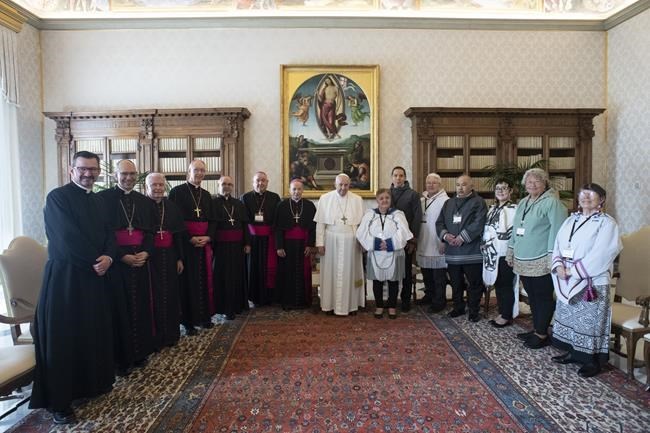ROME — Angie Crerar says she was nervous when she walked into a room at the Vatican and came face to face with Pope Francis.
But she left feeling empowered.
The 85-year-old Métis elder knew when she was in a residential school as a child that what was happening wasn’t right. She wanted to tell the person in charge — the one at the top. Now, almost 80 years later, she has.
"They did not break us. We are still here and we intend to live here forever," said Crerar, who is from Grande Prairie, Alta.
Métis and Inuit residential school survivors and leaders had meetings with the head of the Roman Catholic Church at the Vatican on Monday.
The weight of the historic moment was palpable to many. Delegates spoke about wanting the Pope to truly hear their stories and understand how they've been shaped by the legacy left by the Catholic Church and colonialism.
Inuit residential school survivor Martha Greig said she told the Pope there is a need to heal. That means working toward forgiveness, which she says the church must play a role in. If Pope Francis came to Canada to deliver an apology, it would mean a lot to survivors and their families, she said.
"If you don't forgive, it eats at you, though you don't forget," Grieg said.
Those who met with the Pope on Monday said justice, transparency and an apology are even more important now that unmarked graves have been found at former residential schools across Canada.
The pontiff did not offer an apology to either group of delegates.
Cassidy Caron, president of the Métis National Council, said she feels Francis committed to a journey of justice.
“He repeated 'truth, justice and healing' and I take that as a personal commitment," Caron said outside St. Peter's Square.
The Métis have always requested that any apology take place on Canadian soil, she added.
Eight Métis delegates spent an hour with the pontiff and three survivors shared their stories of residential schools.
The group presented the Pope with a pair of red, beaded moccasins as a sign of the Métis people's willingness to forgive if there is meaningful action. The red represents the traditional red papal shoes, the group explained, and the Pope walks with the legacy of those who came before him — including the terrible parts.
Pixie Wells, president of the Fraser Valley Métis Association in B.C., said she was proud to be a two-spirit person in the room with the Pope. She said that homophobia is directly connected to colonization and residential schools.
"We are bringing back that cultural component of being a two-spirit individual," Wells said. "We were leaders, healers in our communities … that was my power in that room for every other two-spirit person."
The eight Inuit delegates presented Francis with a stole, which is a liturgical vestment, and a rosary case, both made of seal skin. They also provided him with two carvings and some personal messages.
Natan Obed, president of Inuit Tapiriit Kanatami, specifically asked the Pope to intervene in the case of an Oblate priest, Johannes Rivoire, who continues to live free in France despite multiple allegations of sexual abuse linked to his time in Nunavut.
"We ask that the Pope speak with Father Rivoire directly and ask him to go to Canada to face the charges he is up on in Canada," Obed said.
Obed asked the Pope to request that France step in if Rivoire is not receptive
Obed said he wants the relationship with the Catholic Church to be based on action, and that includes seeing members of the church brought to justice if they have done harm.
There were also positive conversations about the role of the church moving forward, he said.
"There was a true sense of openness and kindness that was showed to us."
First Nations delegates are to meet with the pontiff on Thursday. All three groups are to gather with the Pope on Friday.
An estimated 150,000 Indigenous children were forced to attend residential schools, more than 60 per cent of which were run by the Catholic Church.
A total of 32 Indigenous elders, leaders, survivors and youth are taking part in the Vatican meetings. The Canadian Conference of Catholic Bishops, which organized and is paying for the delegation, has also sent a handful of members.
Bishop William McGrattan, vice-president of the bishops, said the meetings are "just the beginning" and are important so that Pope Francis can hear first-hand the impacts of residential schools.
"We are not just doing this for now. We are doing it for generations to come," he said.
This report by The Canadian Press was first published March 28, 2022.
Kelly Geraldine Malone, The Canadian Press



